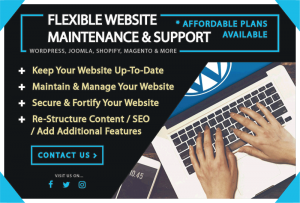If you haven’t changed up your website in a few years, it’s time to consider an update. Make sure it includes these 3 features.
Ever since businesses started using the Internet for commerce solutions, one thing’s been constant: the need to evolve with consumer behaviors.
Much like local brick-and-mortar stores need to adapt to compete with off-site retailers, so, too, do businesses need to adapt to the way customers interact with their sites when making a purchase.
As we move into a more mobile-driven landscape—and one where frictionless buying truly is the holy grail—website design mindsets need to change with the ever-evolving buyer. With that in mind, here are three of the top Web design trends for next year.
1. Truly Interactive Storytelling
There’s a lot of buzz online at the moment about how businesses need to tell better stories to connect with their customers. The problem is, while this advice is generally good, it also places a lot of pressure on business owners to try to work out what your story is and how to tell it. Some companies have found a way to do it—just take a look at Tesla Motors.
The company’s Go Electric page answers consumer questions about the evolution of the Tesla motor, how the electric-powered cars work, the benefits to users and much, much more. Check it out for yourself—simply scroll down the page and see how the story plays out with multiple forms of media.
This is the way to tell your brand’s story, and you don’t need the design budget of Tesla to do so. If you run a WordPress powered site, Aesop Story Engine is a wonderful solution that enables you to blend multiple media together to tell one cohesive story. From text and full-width images to overlaid videos, PDF embeds and historical timelines, it’s an excellent and inexpensive solution for your business.
2. Richer Backgrounds on Web Pages
One of the most underused components in Web design is the background of your site’s pages. Many sites are content to have a simple dark font on a white background (or vice versa) and let the copy do the talking. However, you’re missing a big opportunity to really attract your visitors’ attention.
While there’s been a rise over the past few years in using background images, the ability to really make backgrounds more than just static images opens up a whole new world of design potential. HTML video, for instance, allows you to have fully responsive HD video embedded in the background of whatever your sales page or call-to-action may be.
Think of sports teams selling season tickets: You enter which game you went to that year, and the site loads video replays of that game’s best plays on-screen. Depending on which seat you choose, the video can highlight that, and the call-to-action could might be “Relive the magic again—your seat is reserved.” The design is simple, effective and plays to the buyer’s impulses, given their connection to the product, their sentiment around a victorious day and the very seat from which they watched it all happen.
3. One-Page Scrolling Instead of Clicking
Scrolling website design, which is when all the information about your company, services and more is on one page, has its critics, mainly because of its potential impact on SEO and how one-page design is implemented. But there’s no denying that it’s becoming more popular—and understandably so.
Instead of having to worry about poorly implemented navigation menus that use multiple drop-down tabs, the one-page site can offer an elegant and effective experience for the end user.
Additionally, one-page websites are perfect for the kind of interactive storytelling highlighted at the start of this article.
The Future Is Bright
These three trends are just a few examples of where the Web is heading from a design point of view in the coming 12 months and beyond. Also making inroads in Web design are:
- retina display, which allows for much higher-resolution browsing on tablets, smartphones and hi-definition monitors;
- material design, which takes the current-darling flat design and adds slight gradients and layers to achieve a richer effect; and
- a more personalized experience—driven by cookies—that remembers a visitor’s preferences and loads up a customized UX on their next visit.





